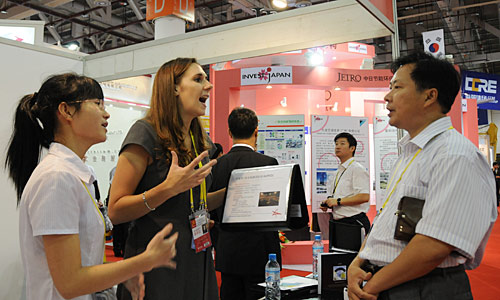|
 |
|
GLOBAL MIXER: Li Haoqing (right), Chairman of Jiangxi Yifu Industry Co. Ltd., talks with a U.S. businesswoman. The CIFIT provided a platform for Chinese firms searching for opportunities to expand overseas (ZHANG CHENCEN) |
"We try to attract more Chinese investors as we believe they have great potential of growth overseas," said Francois Dutriez, Project Manager of Nord France eXperts, a development agency for the Lille region of France. "To help them succeed, our agency provides a handful of free services, including business location proposals, talent training and financial services."
But this does not mean the path overseas is clear cut and worry free. The slowdown in Western economies has caused many Chinese companies to be cautious with their outbound forays. Despite the attraction of global reputations, Chinese companies don't want to face waning demands in markets that they don't understand.
For now, it may be wise for Chinese firms to focus on the home market, and invest in foreign countries with the best prospect of recovery, Balasubramanian Muthuraman, Vice Chairman of the Indian conglomerate Tata Group, told Beijing Review on the sidelines of the fair.
The China Council for the Promotion of International Trade (CCPIT) released results of a survey of its 1,377 member companies in April 2010. Of the 344 firms with an overseas presence, 61 percent were only involved in minor investments valued at less than $1 million.
Acquiring financing has been the major impediment to expansion, said Zhao Xiaodi, Director of Economic Information Department of the CCPIT.
But efforts to soothe the financial woes are already on the way as banks extend a helping hand.
Wang Chen, a manager at the Corporate Banking Department of the Industrial and Commercial Bank of China, said the bank is enhancing supportive services to the firms developing beyond China's border, including export credit, funds management and risk management of currency exchange.
"Meanwhile, the bank is also expanding global networks of its own in a bid to reach more Chinese corporate clients overseas," said Wang.
A long way to go
While the stream of Chinese investment grows, success is far from guaranteed. The obstacles that Chinese firms must overcome are immense—a lack of managerial and cross-cultural experiences needed to build a multinational with operations and brands spanning the globe.
Indeed, for Chinese manufacturers, managing a global supply chain with complex tax regimes, import-export requirements and cross-border logistics requires much broader expertise than simply producing goods with cheap labor. Not to mention the challenges of dealing with local government and unions, and the intricacies of marketing to sophisticated consumers.
After acquiring IBM's laptop business in 2005, China's PC maker Lenovo geared up to venture abroad. But the global downturn led to deep losses and prompted the company to turn its attention back to the Chinese market. In another case, the Shanghai Automotive Industry Corp. (SAIC) acquired a 48.9-percent interest in the South Korean automaker Ssangyong Motor Co. But the SAIC has almost given up the investment as its tense relations with Ssangyong's labor unions drained life from the venture.
"Chinese firms must be clear about target customers and advantages in the overseas market, and be sensitive to the local culture," said Alan Turley, Vice President for International Affairs in Asia Pacific for FedEx Express. "This will be a prolonged learning process for them."
The Chinese refrigerator maker Haier, for example, is faring well in the U.S. market with its keenly priced mini-refrigerators becoming a big hit in student dormitories. In the 1990s, its exports enjoyed a solid customer base. But the company did not set up a subsidiary in the United States until 1999 when it had three years of experience operating in the Philippines and Malaysia.
But expansion strategies vary in different industries and market situations, and sometimes, M&As could effectively clear the way for globalization, said Turley. "FedEx, for instance, acquired the Singaporean airlines Flying Tiger in 1989, and gained access to the Asian market," he said.
Compared to ambitious M&A deals, organic expansion is probably a better way to go, especially in emerging Asian markets where competition is less fierce, said Muthuraman of Tata Group.
In addition, it would be easier to recruit ethnic Chinese there who can help bridge the culture and language gap. After all, talent is the most important element of cross-border management, he added. | 